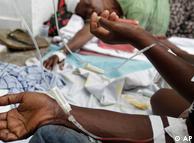
The article "Nigeria Cholera Epidemic kills 800 in 2 months" is about the cholera epidemic that struck Nigeria in September. This is the worst epidemic to reach Nigeria in 19 years. According to the World Health Organization, 7,654 people died in 1991 from cholera. So far the disease has spread to Cameroon, Chad, and Niger, killing hundreds along the way. In Nigeria alone 13,000 people have become ill with this disease. In Cameroon 300+ people have died and 5,000 are ill. In Chad 40 have died and 600 are ill. This article can be found at www.cbsnews.com.stories/2010/09/10/world/main6853420.shtml.
As we have learned from class cholera is a fast-developing, highly contagious infection that casues diarrhea, leading to severe dehydration and possible death. The most common way that cholera is spread is through dirty drinking water. In Nigeria half of the country's 150 million people lack access to clean drinking water and proper sanitation. Poor sanitation "is the backbone of this disease," said Adamu Abubakar, a Red Cross offical stationed in Nigeria. Cholera is easily treatable through rehydration.
So many people have gotten cholera that all the beds in the "hospitals" are filled so the doctors have to place the sick in storerooms and concrete hallways wet with human waste. IV's are scarse so only the really sick get them. Most of the time they go to small childern because they can die from cholera faster than adults. In the "hospitals" with not a lot of money beds do not exsist so people are using torn, yellow mattresses with only a plastic bucket underneath it to catch the waste.
People have volunteered to go out and spreay chlorine, a solution designed to kill the cholera bacteria, through the crowded, narrow, dirt filled streets of NIgeria. Chlorine tablets have also been placed in the wells. The only problem with the chlorine is that it does not last very long, so the people of Nigeria can still get cholera. The local government in Nigeria has informed the public about this disease and how to prevent yourself from contracting the disease.














